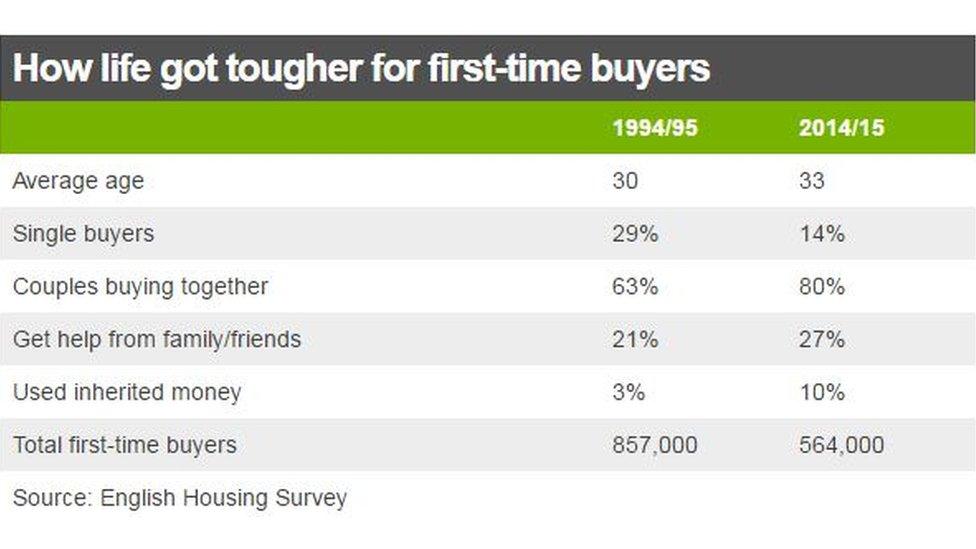Parents '10th biggest mortgage lender'
- Published

The "Bank of Mum and Dad" is the 10th biggest UK mortgage lender as buyers increasingly rely on financial support from their parents, a report suggests.
Parents will lend £6.5bn this year, according to insurer Legal and General, and be involved in 26% of all UK property transactions.
This is up from the £5bn of lending estimated in L&G's equivalent survey a year ago.
The average first-time buyer requires a deposit of about £26,000, lenders say.
Figures from the Council of Mortgage Lenders (CML) show that the average first-time buyer with a mortgage in the UK is 30 years old and borrows an average of £132,100.
Price war
The L&G research suggests that parents will provide deposits for more than 298,000 mortgages.
Last year, it suggested that parental financial support made the Bank of Mum and Dad the equivalent of the 10th biggest UK mortgage lender, and this ranking has not changed.
The proportion of property transactions that they are involved in has also been relatively static from a year earlier - but parents' gifts, loans or inheritance values have risen to an estimated average of £21,600 this year compared with £17,500 a year ago.
Some 79% of this parental funding goes to property buyers aged under 30, L&G claims.
This is despite a price war between mortgage lenders, which has pushed mortgage rates down to historically low levels. However, lenders typically require a larger deposit than was the case before the financial crisis.

Rob Taylor said one of the most difficult hurdles in buying a house was the stamp duty
Stamp duty can also be an issue for some buyers, such as Rob Taylor, 30, and Hannah Wilkinson, 25.
"My fiancee and I both started working as lawyers in August 2013 as trainees in London and immediately began saving for a house by putting about 30%-40% of our salary away. We were aiming to get a 10%-15% deposit down," said Mr Taylor.
When they found a property, their parents still helped them with thousands of pounds.
"The real difficult hurdle was not necessarily the deposit, but the stamp duty, which is a huge cost," he said.
"The house we bought is a three-bedroom end terrace in East Greenwich. We were fortunate that our parents were in a position to lend the money - we're going to be paying it back as soon as possible - and without them it would not have been possible as we watched house prices to continue to rise."
Legal & General chief executive Nigel Wilson said: "Parents want to help their kids get on in life, and the Bank of Mum and Dad is a testament to their generosity, but it is also a symptom of our broken housing market."

The research echoes the government's own English Housing Survey, external which showed that, in 2015, some 27% of first-time buyers relied on friends or family for help with a deposit.
Some have reacted to the L&G survey on social media pointing out that the Bank of Mum and Dad is simply inherited wealth.
Others state their annoyance that such funding is only an option for some buyers, and should not be considered as a recognised source of mortgage deposits.
Elsewhere, Mark Harris, chief executive of mortgage broker SPF Private Clients, said: "Money from parents must really be a gift rather than a loan as far as mortgage lenders are concerned, so that it doesn't impact the borrower's affordability.
"Getting the correct legal documentation in place is also crucial, particularly if one set of parents is providing support to a young couple. Parents will want to protect their deposit gift if the couple split up so that it is returned to the parents and not split between the two parties.
"Parents who wish to maintain control over their savings may consider alternatives to simply handing them over."

Analysis: Simon Gompertz, personal finance correspondent
Some parents lend money to their children to help with a deposit, others manage to give them the cash outright.
Many grandparents are doing the same. Should they be worried about tax being due, inheritance tax in particular?
A gift escapes the tax if you live long enough.
"If they survive more than seven years, then it's not subject to inheritance tax," says Nimesh Shah, Tax Partner at accountants Blick Rothenberg.
But a loan doesn't have the same tax-saving potential, he warns. It would still count as part of the giver's estate.
And if the Bank of Mum and Dad demanded regular repayments, the mortgage lender might take fright and cut the maximum mortgage loan being offered.
"As long as they don't require monthly payments and are prepared to confirm that to the lender, it won't impact on the amount being lent," says Ray Boulger from mortgage brokers, John Charcol.


Have your family lent you money to buy your home? Or have you lent money to your children to help them buy their home? Email us at haveyoursay@bbc.co.uk, external
You can also contact us in the following ways:
Tweet: @BBC_HaveYourSay, external
WhatsApp: +447555 173285
Text an SMS or MMS to 61124 (UK)
- Published9 July 2020

- Published30 August 2016

- Published28 April 2017
